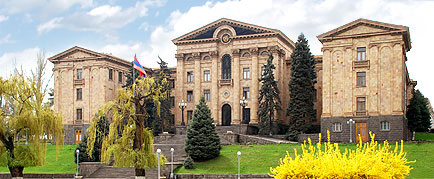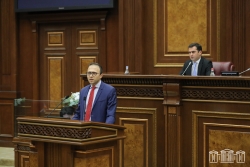In February 2022, when the Russian-Ukrainian conflict began, there were serious upheavals in the international economic and financial markets. All over the world, the prices of food and raw materials, as well as the level of risk in the financial markets, increased significantly. In 2022, inflation in the RA began to increase, and the Central Bank had to resort to the policy of increasing interest rates. The Deputy Governor of the RA Central Bank Armen Nurbekyan said this.
At the regular sitting of May 25, Parliament debated the annual report on the activity of the RA Central Bank. According to the key rapporteur, as a result of the real and financial flows of the RA during 2022, the potential of the RA has increased to a certain extent. “The Central Bank currently predicts that inflation will continue to decrease, which is a very important circumstance. At the same time, the Council considers that we should be very careful, understand what the real reasons for the decrease in inflation are and avoid economic overheating, which will allow us to have stable and long-term economic growth. Our monetary policy of 2023 will also be aimed at this. We expect that at the end of this year we will have about 3% inflation,” Armen Nurbekyan said.
One of the questions raised by the Deputy Chair of the NA Standing Committee on Economic Affairs Babken Tunyan referred to the difficulties exporters face as a result of exchange rate fluctuations. The Deputy Governor of the Central Bank mentioned that Armenia’s economy is small and open, and when there are shocks due to changes in the world, it should naturally be expressed in Armenia. “In that case, companies should take into consideration that there are such risks. We have really done substantial work,” the key rapporteur explained.
Addressing Babken Tunyan’s second question regarding possible problems concerning non-cash transactions, Armen Nurbekyan noted that during 2022, serious investments were made in infrastructures, and today there is an opportunity to make non-cash transactions in villages with 1000 or more inhabitants. The Deputy Governor of the Central Bank also considered the significant price differences during cash and non-cash purchases by banks as unacceptable. “This is unacceptable behavior for us and we must have a relevant position,” he said.
Responding to Babken Tunyan’s question about Armenia coming under additional or secondary sanctions in the context of the sanctions imposed to Russia, the key rapporteur said: “The RA must refrain from arbitrary, primary or secondary sanctions. This is an absolute necessity for the Central Bank and, I think, for the Government as well.”
The MP Sona Ghazaryan inquired about the economic growth recorded in the RA. “There was really a very high economic growth in the RA in 2022. But, at the same time, we avoided major overheating, and we had low inflation along with high economic growth,” the Deputy Governor of the Central Bank of Armenia stressed.
Armen Khachatryan inquired what kind of banking policy is implemented for foreign citizens, so that favorable conditions are created for them to buy apartments with a mortgage loan or to carry out new economic activities. “The banking system is concerned about significantly increasing crediting,” Armen Nurbekyan said.




 25.05.2023
25.05.2023 25.05.2023
25.05.2023 25.05.2023
25.05.2023 25.05.2023
25.05.2023 25.05.2023
25.05.2023 25.05.2023
25.05.2023 25.05.2023
25.05.2023 25.05.2023
25.05.2023 25.05.2023
25.05.2023 25.05.2023
25.05.2023
